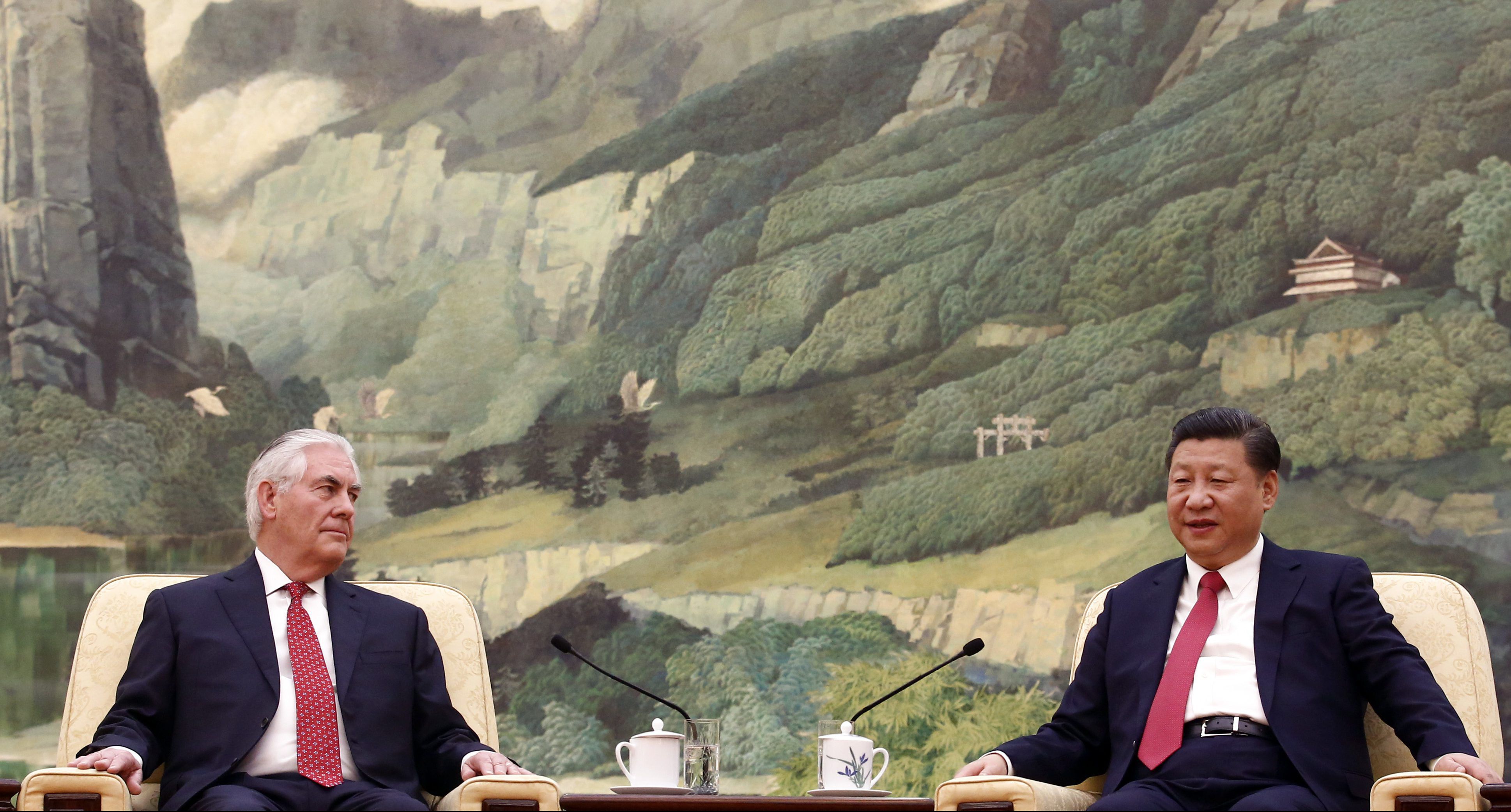
U.S. Secretary of State Rex Tillerson visiting Chinese President Xi Jinping in Beijing.
U.S. Secretary of State Rex Tillerson recently concluded a trip to Asia which included visits to Japan, South Korea, and China. With respect to the Chinese leg of the tour, the North Korean crisis and trade were among the many issues discussed between the two sides. As the North Korean situation has proved particularly intractable over several decades, perhaps more novel solutions need to be investigated. One of these solutions may be a proposal for a permanent, non-aligned stance for a unified Korea in order to allay the security concerns of the great powers within the region.
To combat the increasing range of North Korean ballistic missiles following the most recent test, the U.S. has begun deployment of its THAAD system to not only better protect itself from possible attack, but also to protect its South Korean and Japanese allies as well. However, THAAD deployment has been highly controversial due to the capability of its X-band radar component to surveil deep into both Chinese and Russian territory. This ability not only has the potential to upset the existing regional balance of power within Northeast Asia itself, but global security as a whole as the THAAD radar would impact both Chinese and Russian missile strike capabilities against the U.S. proper.
Most likely, this will simply lead to an accelerated arms race by both China and Russia focused on newer missile technology in order compensate for the THAAD radar capabilities. This security dilemma reflects China’s stance that it simply is not possible to have “perfect” security for oneself, while simultaneously denying the legitimate security concerns of others. Additionally, this stance was a major impetus behind China’s endorsement of Kazakhstan’s Conference on Interaction and Confidence-Building Measures in Asia (CICA) initiative.
China has also proposed its own “double cancellation” deal in order to resolve the North Korean dilemma. This proposal would involve the cessation of North Korean missile tests in exchange for the termination of joint U.S.-South Korean military drills in the region. Unfortunately, the proposal is considered infeasible by the U.S. as it wouldn’t allow it to fulfill its treaty obligations to South Korea. These regional drills affect Russia’s security interests in the area as well and are surely a factor in Russia’s recent deployment of troops to the Kuril Islands, further inflaming ties with both Japan and the U.S.
Pivoting back to Europe, yet another security dilemma affecting Russia may hold an answer to the North Korean situation, namely the Ukraine Crisis. While the Ukraine Crisis may not have lasted as long as the situation on the North Korean peninsula, it is surely as equally intractable. The two situations are also similar in other ways. Whereas the Six-Party Talks have failed to provide a permanent solution with respect to North Korea, the Minsk Agreements have had little to no effect in resolving the underlying security concerns of the parties involved. Additionally, both situations are legacies of the Cold War, further proving that a war’s end can have long-lasting effects on both “winners” and “losers” alike.
Several advocates of realism in international relations have proposed that only a Ukraine that professes permanent neutrality between The West and Russia can hope to solve the Ukraine Crisis. These advocates, including Dr. John Mearsheimer of The University of Chicago, maintain that only such a solution will permanently address the underlying strategic issues currently dividing The West and Russia. There is historical precedent here as well, as neutrality for a re-unified Germany was the original condition proposed by the Former Soviet Union during the waning days of the Cold War.
While such a corresponding solution to the North Korean situation may indeed be labelled as “radical”, with details sketchy, surely now is the time for radical thinking given that the U.S. has clearly stated that its policy of “strategic patience” with North Korea is now over and is also stating that “all options are on the table”. In theory, such a solution has the potential to allay the legitimate security concerns of China, Russia, Japan, and the U.S. Both China and the South Korean people as a whole have repeatedly favored continued dialogue with North Korea as opposed to “other options”.
Lastly, and most importantly, a unified and permanently neutral Korea may not only be the key to Korea’s re-emergence as a great power within the region itself, but ultimately is a question that the Korean people (and no one else) have to decide for themselves.